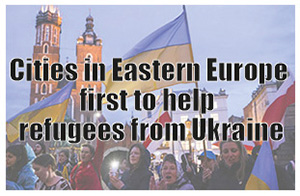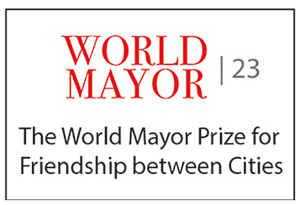WAR IN UKRAINE Cities in Eastern Europe first to help refugees from Ukraine By City Mayors Research*  ON THIS PAGE: Eastern Europe welcomed some 2.5 million refugees ||| Border cities are first port of call ||| Mayors warn, without help cities cannot cope ||| Moldova ||| Poland ||| Romania ||| Czech Republic ||| Sources ON THIS PAGE: Eastern Europe welcomed some 2.5 million refugees ||| Border cities are first port of call ||| Mayors warn, without help cities cannot cope ||| Moldova ||| Poland ||| Romania ||| Czech Republic ||| SourcesWORLD MAYOR 2023: The 2023 World Mayor Prize is dedicated to Friendship between Cities. The Honours will be awarded to mayors and cities that have made outstanding contributions to friendship, partnership and cooperation between towns and cities at home and across borders. PLEASE ELECT YOUR CANDIDATES Eastern Europe welcomed some 2.5 million refugees December 2022: Russia’s war against Ukraine has forced many millions of Ukrainians to flee their homes. It has virtually destroyed hundreds of cities and villages and continues to bring devastation across the whole country. Ukraine is on the brink of a humanitarian catastrophe this winter after weeks of intense Russian attacks on the country's energy and water infrastructure. Up to ten million citizens live without electricity, with temperatures dropping to below minus ten degrees in some parts of the country. Since the beginning of the war in February 2022, the countries bordering and closest to Ukraine have recorded almost 2.5 million refugees. Poland, alone, offered shelter to some 1.5 million Ukrainians, while the Czech Republic and Slovakia welcomed 470,000 and 103,000 refugees respectively. Romania, Bulgaria, Moldova and Hungary accepted tens of thousands people seeking shelter and safety. In Western Europe, Germany offered protection to some 1.2 million people fleeing Ukraine. Italy (165,000), France (120,000), Spain (157,000) and the UK (148,000) also provided support schemes to help Ukrainian refugees. Many smaller European countries like Austria (90,000), Belgium (62,000), Estonia (41,000), Finland (45,000), Ireland (66,000), Netherlands (80,000), Lithuania (71,000), Portugal (52,000) and Sweden (50,000) also took in large numbers of people fleeing the war in Ukraine.  Border cities are Border cities arefirst port of call For the masses of people fleeing the war in Ukraine, the cities in Eastern Europe, particularly those close to the border, have offered immediate humanitarian aid. Chisinau, the Moldovan capital, has attended to 35,504 refugees who crossed the city, of which an estimated 10,000 established temporary residence there. Also serving as a frontier city is Ungehni, the seventh largest Moldovan town with a population of 43,000. The town, which borders Romania, received around 4,850 refugees, of which more than 90 per cent continued to other destinations. Przemysl, one of Poland’s border cities with Ukraine, served as a reception point, where incoming refugees could be accommodated for a few days and then transported to other cities in Poland and Europe. The city, which had an estimated population of about 60,000, provided protection for around 6,000 refugees who opted to stay there, owing to proximity with their home and family, and the provision of bilingual classes in schools. Reszow, another frontier point in Poland, used city buses to provide transportation from the border to other cities, with most of the refugees opting to move on to larger cities such as Warsaw, Krakow, Gdansk and Wroclaw. Poland has recorded over 1.5 million Ukrainians – the highest overall number of any neighbouring country. In Bucharest, Romania, around 55 to 65,000 refugees are estimated to be currently based in the city. Mayors warn, without help cities cannot cope But with unprecedented and fast-evolving emergency needs and dwindling public resources – and with many cities still recovering from the pandemic and now facing intensifying energy and climate crises as the risk of protracted conflict looms – mayors have asked for far greater support from national, regional and international sources. A survey by the United Nations Economic Commission for Europe (UNECE) found that many cities were quick to put in place the necessary administrative procedures and flexibilities for hosting refugees and also reallocated part of their municipal budgets to cover the costs with the provision of medical services, food, clothes, sheltering and transportation services, with central governments transferring additional funds. Moldova Chisinau, for instance, earmarked 4.25 million lei (US$225,000), of which 75 per cent was spent by July 2022. The Moldovan government also allocated 9.55 million lei ($500,000) to cover expenses related to temporary placement centres managed by cities. In addition, civil society in the city donated 3.5 million lei ($185,000), food, household goods and school supplies. Yet despite efforts made and significant support to date, Ungheni’s Deputy Mayor warned that “without generous help from abroad, Moldova will not cope”. Poland According to Andrej Porawski of the Polish Association of Cities, the majority of initial arrivals of refugees to the country knew where they were going: to friends and families. With the second largest population decline in the EU, Polish cities also saw the welcoming of refugees as “not only a challenge but a chance”. Some 1.5 million Ukrainians were already working in Poland before the war, especially engineers and skilled workers, he noted, stressing that the situation remains geographically uneven, with medium sized and smaller cities still waiting for refugees. Romania “In Bucharest, Romania, around 55 to 65,000 refugees are estimated to be currently based in the city,” said Deputy Mayor Horia Tomescu, recalling that approximately 1.4 million Ukrainians have transited the city since February. Among wide-ranging initiatives to meet emergency needs and foster inclusion of refugees, Bucharest partnered with UNICEF to open a Romanian language summer school to facilitate children’s integration, together with a number of initiatives to help refugees find jobs with local businesses. However, many remain reluctant to make medium and long-term plans, the Deputy Mayor noted. Looking ahead to future needs, he warned that “the city could not shoulder the burden of providing such large-scale assistance alone.” Czech Republic in response to the Russian invasion of Ukraine, the City of Prague approved the provision of emergency care vehicles for the injured, which were used by the Prague City Ambulance Service and 20 power generators. At the end of October, the transfer of a total of 20 trams and two buses to the Ukrainian cities of Kharkov and Khmelnitsky had begun. Prague has a new long-term strategy to help refugees from Ukraine and is preparing a Follow-up Support Centre for refugees from Ukraine. This will ensure that people fleeing the war have their individual needs addressed in areas such as housing, health, education and child protection. "The City of Prague is trying to help where it is needed. Russia is attacking civilian infrastructure in Ukraine, which is making life very difficult for the people there,” said Mayor Zdenek Hrib. “We want to help with the immediate reconstruction of the cities so that people are not forced to flee their homes. In parallel, we are moving from acute assistance to Ukrainian families who have come to Prague to long-term systematic assistance.” *Sources The research was conducted in December 2022. Sources used include: United Nations Economic Commission for Europe (UNECE); The United Nations Human Rights Council (UNHRC); The Polish Association of Cities; The Cities of Bucharest and Prague. © Copyright: All content of the City Mayors and World Mayor websites are protected by worldwide copyright. Please contact the editor if you wish to use any material from the City Mayors, World Mayor or Women Mayors websites. Follow @City_Mayors |
|


